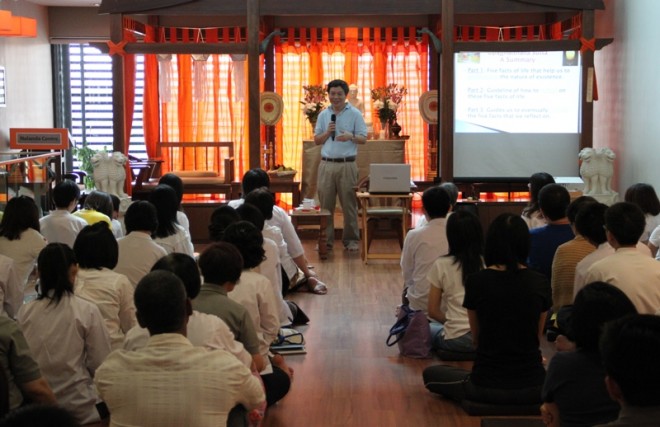Five Daily Reflections
Five Daily Reflections
The following is a summary of Bro. Benny Liow’s Dhamma talk during the Gimhana Service Sunday on 30 June.
On 30 June, Bro. Benny Liow, Editor of YBAM’s Buddhist journal – the “Eastern Horizon”, gave a Dhamma talk on the “Five Daily Reflections”. Bro. Benny quoted from the Upajjhatthana Sutta (AN 5.57) on the five facts of life that should often be reflected upon.
- I am subject to aging.
- I am subject to illness.
- I am subject to death.
- I will grow different, separate from all that is dear and appealing to me.
- I am the owner of my actions. Whatever I do, for good or for evil, to that will I fall heir.
How does one benefit from reflecting on these five facts? Many people are intoxicated by their youth, health and life. We have desire for the people and things that are dear to us, and excited by this lust, we engage in misconduct by body, speech and mind. Contemplating the first three facts allow us to have a correct view of our lives, while the fourth contemplation will weaken our attachments, and the fifth contemplation encourages us to be always mindful of our actions through body, speech and mind.
Bro. Benny reminded that aging can also be about growing with wisdom and grace, not simply just growing old. Sickness and death too should be contemplated as a certain and natural part of life. Often reflecting upon these facts, the intoxication with youth, health and life is either completely abandoned or diminished. By understanding impermanence, we will not insist on life’s events always happening our way. When all things are impermanent, it does not mean that they are worthless, but that clinging to them will eventually lead to our suffering. However, if things and events did not have the nature of changing from moment to moment, we would be unable to explain how transformation takes place over time. It is this fundamental law of nature, impermanence, which creates the potential for our own change, development and progress.
A true Dhamma practitioner then reflects that “I am not the only one who is subject to aging, illness, death, grow different and be separated from all that is dear and appealing to me. I am not the only one who is the owner of my actions. Whatever I do, for good or for evil, to that will I fall heir.” Often reflecting in this way, the path is generated. Pursuing this path, developing and cultivating it, the fetters are abandoned and the underlying tendencies destroyed.
In summary, this Sutta first explains the five facts of life that help us to understand the nature of existence. Then it provides a guideline of how to reflect on these five facts of life, and finally leads one to eventually become free from suffering upon realisation of the truth. With these five reflections in mind, let us make the most out of our daily lives to strive diligently in our practice, and grow in wisdom.


